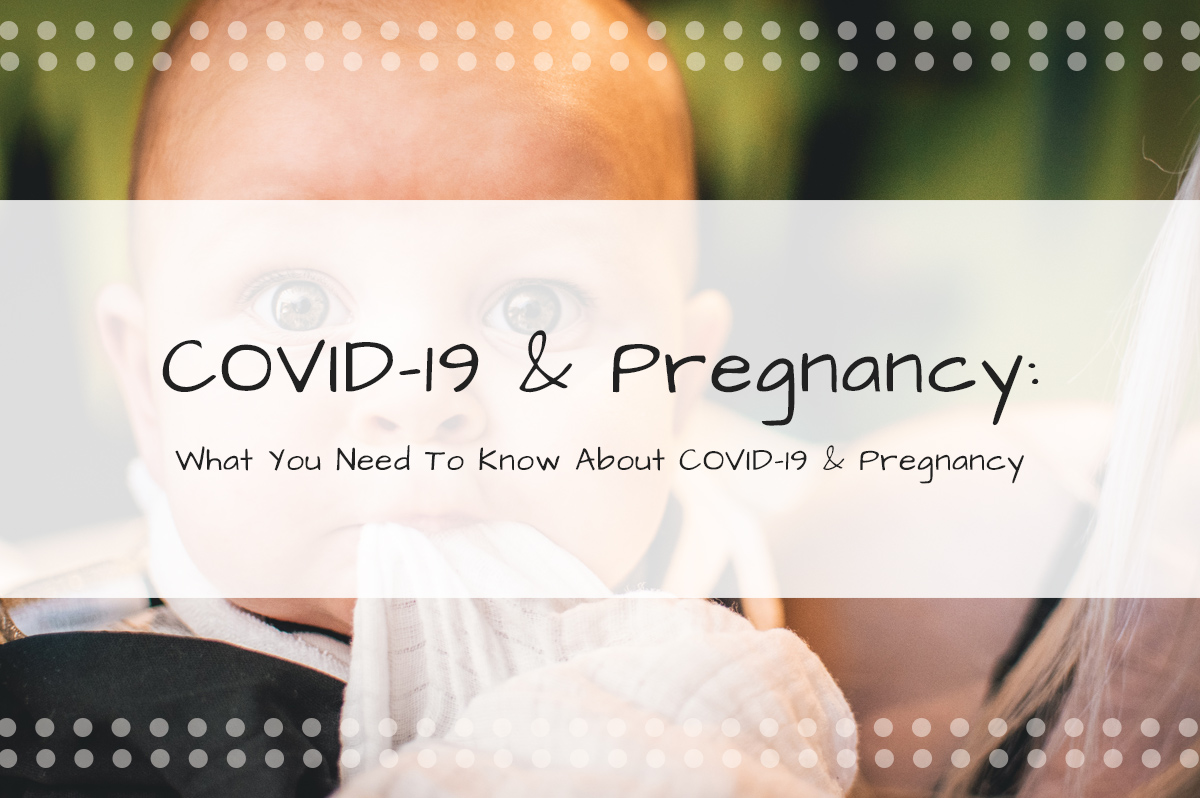
COVID-19 and Pregnancy: What You Need to Know About COVID-19 and Pregnancy
For women who are looking to become pregnant or are already pregnant, your anxieties may have worsened due to the COVID-19 outbreak. Is this a good time to become pregnant? Is it safe? For those who wish to become a surrogate, is now the best time? We’ll go through all of the top questions that some women have about COVID-1919 and pregnancy to help you figure out whether or not you should become a surrogate.
Does COVID-19 have a different impact on pregnant women?
As the current data suggests, pregnant women are not any more susceptible or at-risk than non-pregnant women with COVID-19. The only risk that women have, pregnant or not, is if they already have underlying health issues. The health issues that impact how severe the Coronavirus may affect them are lung disease, diabetes, or heart disease.
Another note to consider is that COVID-19 isn’t the same as Influenza. Influenza can actually make pregnant women severely sick because it causes their immune system to kick into overdrive.
It’s also important to understand the age bracket that pregnant women fall into and how that might influence their experience with the Coronavirus. Those who work as a surrogate mother have to be between the ages of 21 and 38. This is also the age range that is least likely to have serious cases of the virus.
This is an age range in which you are at your healthiest. It’s still easy to recover from injuries and illnesses. That and with your immune system working hard to keep you and the baby safe, it’s possible that your experience with the virus will be short-lived and easy.
At the end of the day, pregnant women, just because they’re pregnant, shouldn’t need to be sent to the ICU any more than non-pregnant women should they become infected with the Coronavirus.
Do pregnant women need to take extra precautions?
Since being pregnant doesn’t make you any sicker than not being pregnant, it isn’t entirely necessary for pregnant women to barricade themselves in their homes or take even more precautions. Instead, pregnant women should just ensure that they’re following the safety guidelines that are given by the CDC.
Those are to wash your hands thoroughly with warm water and soap for 20 seconds. You’ll want to make sure that every aspect of your hands is washed, including under your nails.
You’ll also want to observe social distancing rules. If you need to travel out in public, then make sure you’re observing the six-feet apart guideline. This is because the COVID-19 virus spreads through respiratory droplets. Those droplets are usually released through sneezing or coughing. Yet it’s even possible to receive it through speaking with an infected person. If close enough, some of the spit that they release naturally through talking could infect you.
Staying six feet away from everyone will help ensure that those droplets dissipate before they reach you.
Can the mother transmit the virus to her baby?
Both mothers carrying their baby naturally and surrogate mothers may worry that they’ll infect the baby if they become ill. Thus far, there isn’t any data that shows that this is possible. While the baby is in the womb, they appear to be safe from becoming infected.
After birth, however, it’s possible for them to become ill either due to a surrogate mother who is infected or by encountering someone else who is infected. Not all babies will show the symptoms of COVID-19.
However, to ensure that the baby is safe after it is born, it’s crucial that families take extra precautions and lower the number of interactions that the baby encounters.
Do pregnant women have different symptoms?
One study found that 88% of the pregnant women in its 215 population did not show symptoms despite having Coronavirus. They were among those considered to be asymptomatic. This describes a situation in which someone is infected with the virus but doesn’t display any symptoms.
As the study shows, a good deal of pregnant women doesn’t display any symptoms. This doesn’t necessarily mean that if you become pregnant, you’ll also become asymptomatic.
The reason for a high number of asymptomatic cases may be due to the overworking immune system in pregnant women.
How are pregnant women being screened at a fertility clinic?
Surrogates may wonder how they’re going to be screened for when they need to visit a fertility clinic. For example, are they going to need to be screened before they receive care? Many clinics are requiring that their patients receive a test before they are allowed to have treatment.
This is an effort the clinics are taking to help stop the spread of infection within their own doors. While pregnant women may not be any worse off than non-pregnant women, many of those who are in the clinic may be suffering from underlying health problems that could become exacerbated if exposed to COVID-19.
Depending on what state you live in, if you intend to visit a fertility clinic soon, then you’ll want to make arrangements to become tested.
What do I do about stay-at-home orders in my state?
In an effort to spread or slow the spread of infection, many states have been placed on lockdown. Residents have to remain home unless they are doing something essential like grocery shopping.
Those who need to visit a fertility clinic may wonder if this counts as an essential business. One important thing for a surrogate mother to know is that a fertility clinic will not order a treatment unless it is safe to do so.
Your appointment is considered essential and IVF/Medical treatment is an essential business. You’re helping a couple struggling with infertility have a baby and your time and participation are essential that being successful. You’ll be able to travel to the clinic and receive the treatment that you need.
You’ll only need to travel to the clinic for your screening and embryo transfer. The intended parents struggling with infertility will need to visit for their own screening and IVF. In-vitro fertilization is the process used to conceive a baby within a surrogate mother.
IVF is performed in the lab and under careful, sterile, conditions. Intended parents shouldn’t have to worry about becoming infected when visiting a clinic for in-vitro fertilization. After IVF is over, the clinic will watch over the embryo until it is ready for the surrogate.
Then the surrogate will travel to the clinic when allowed to do so and go through the process. The embryo should start to divide and she’ll have to carry the baby for the next nine months.
It’s important to follow the orders from your state and to follow the guidelines as closely and safely as possible.
What precautions are being taken at the clinic to make sure I am safe?
Since IVF is essential to the surrogacy journey, you will eventually need to arrive at a clinic. You may wonder if visiting a clinic is safe. Since the clinic is a medical institution, it’s working with other medical departments to ensure that its practices are safe.
One of the ways that they’re helping their patients struggling with infertility and surrogate mothers stay safe is by limiting the number of people in the clinic at all times. Instead of having a few people in their waiting rooms, they now limit the occupancy.
To receive treatments for infertility, or for in-vitro fertilization, or an embryo transfer, you have to have an appointment. This ensures that there are only one or two people in the clinic at any given time. Even those inside the clinic will be shown socially distancing places to sit until their doctor is ready.
They’re also taking extra measures to clean their office. While most clinics already follow a thorough-cleaning procedure, those measures have been kicked up a notch. They understand how delicate the in-vitro fertilization and embryo transfer processes are. They want to ensure that your surrogacy experience goes as smoothly as possible.
Clinics continue to remain updated on the guidelines and rules given by the CDC. They’re adopting those practices to ensure all of their patients are kept safe.
What is the biggest change to my journey as a surrogate?
The only real change that a surrogate will notice in her surrogacy journey is the time it will take to complete that journey. While the embryo transfer part of the journey always faced possible delays, they’re now inevitable. Because clinics have to limit how many patients they see in a day, it could take some time before you’re able to receive your treatment.
This time could be extended if the transfer doesn’t end up working or if the intended parents are unable to create a viable embryo.
Until the pandemic ends, surrogates should expect their journey to last longer.
Should I become a surrogate during the COVID-19 crisis?
With so much uncertainty in the world, you may wonder if now is the time to try your hand at becoming a surrogate. There actually may be no better time. Demands for surrogates has never been higher. With some surrogates choosing to wait out the pandemic, there’s even more opportunity to be matched with intended parents quickly.
In addition, our agency is actually offering a COVID-19 bonus to all who participate in the journey and sign up to become a surrogate during a certain time period. Please consult our compensation page for more details.
More importantly, because there isn’t any real difference as to how the virus affects you if you were pregnant versus if you weren’t, nor does it seem as though the virus can be transferred to the baby while pregnant, there’s really no reason why you shouldn’t become a surrogate during the pandemic.
Finally, due to many women losing their jobs and being forced to receive unemployment benefits, it may be no greater a time than to add some more income to your family.
Compensation for surrogate mothers during COVID-19
Speaking of compensation, our agency typically pays its surrogates anywhere from $40,000 to $50,000. However, due to the pandemic crisis, we’re offering a $10,000 bonus to any surrogate who becomes a surrogate from August of 2020 into the future of when the pandemic has been impacting surrogates. Again, please check our compensation page for the end dates and more details about the COVID-19 bonus.
That amount will be split into three installments. The first $2500 is given after they have been legally cleared with their intended parents and signed a gestational contract. The second $2500 is given after the first transfer, and the final $5,000 is given after confirmation of their pregnancy.
This allows surrogates to earn anywhere from $50,000 to $55,000 during those months. Clearly, you can earn a great deal for your family during a time in which the economy and employment seem uncertain.
With our surrogate compensation, many of your expenses are covered by the intended parents. If you need new maternity clothes, for example, then intended parents can give you an allowance to use on new clothes. Perhaps you need travel expenses covered, then the intended parents will cover that as well.
Surrogacy has never been more enriching and helpful during the time when intended parents are lining up to have the baby they have always wished for to make times at home all the more enjoyable!
Stay Up to Date on the Coronavirus and Join Us Today

Demand for surrogates has only increased since the onset of the pandemic. If you want to make sure that you have money to give to your family, then working with us could be a great way to do that. With our COVID-19 bonus in effect, you can earn even more. Finally, with clinics taking extra precautions to keep their surrogates safe, you can be sure that they’ll have your back.
Join our agency to learn more about being a surrogate.
